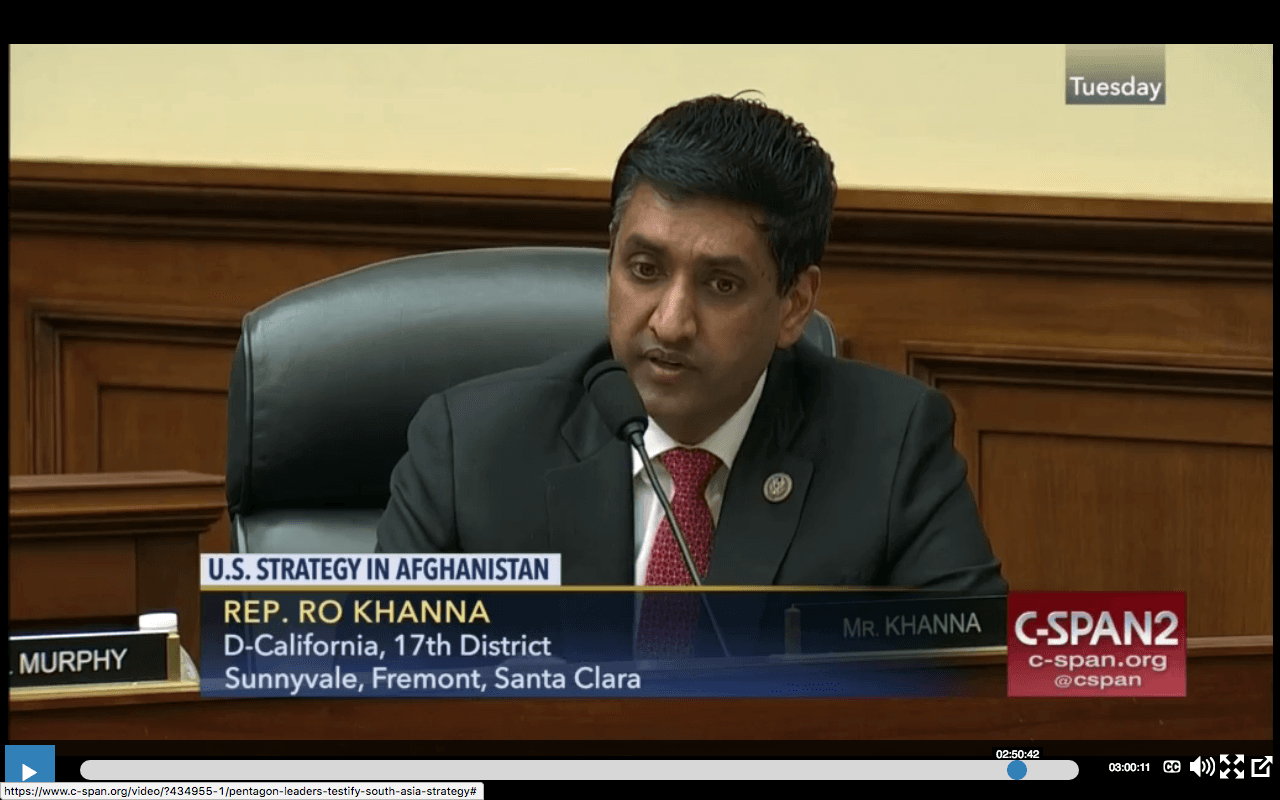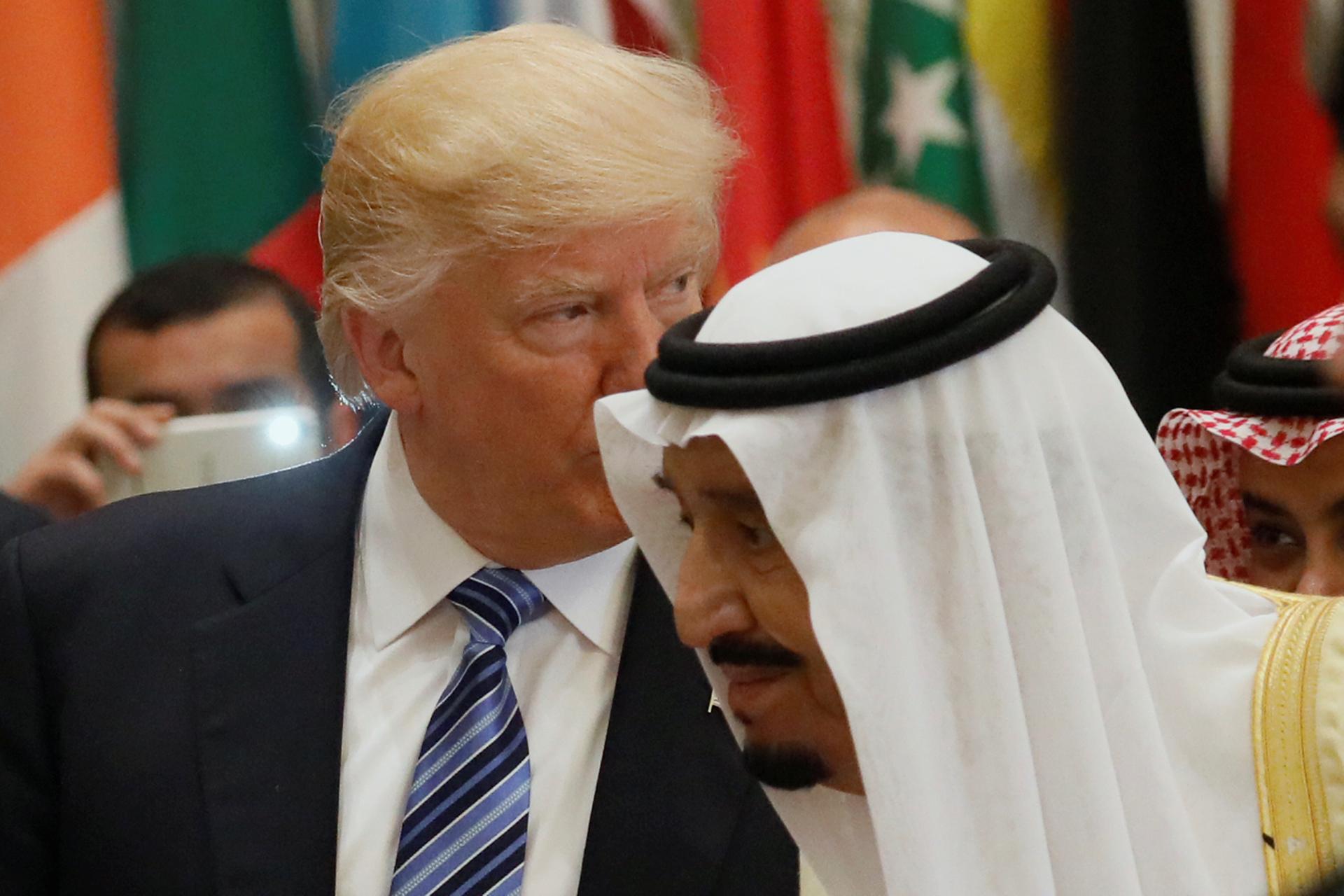US President Donald Trump and Saudi Arabia's King Salman meet in Riyadh, Saudi Arabia.
The US is helping Saudi Arabia wage a war in Yemen, largely in secret. A congressman from California wants to bring it into the open.
Representative Ro Khanna, a Democrat, and dozens of other members of the House have co-sponsored a resolution that requires debate on US military involvement in Yemen. In 2015, President Barack Obama supported Saudi Arabia's war effort in Yemen, and President Donald Trump has continued the mission. Khanna, who represents voters in Silicon Valley, says it’s time for an open debate over America's role in the Yemen conflict.

“I wish someone had brought up the vote earlier,” he says. “We should never have been part of aiding the Saudis in this effort.”
On March 26, 2015, Saudi Arabia and an Arab coalition took sides in the Yemeni civil war. The Saudi-led coalition brought massive firepower to a complex turf battle between forces loyal to Yemen's president and the rebels who ousted him, a militant religious group known as the Houthis. The United States supplied weapons, logistics and intelligence to help its Saudi allies control Yemen's airspace, blockade Yemen's seaports and conduct a bombing campaign called Operation Decisive Storm.
The Saudis prayed for a "quick and decisive victory." That was 31 months ago.
The fight for control of Yemen shows no sign of stopping. The war has killed thousands of civilians, caused widespread food shortages and triggered a cholera epidemic. Yemenis have been plunged into the world's worst humanitarian crisis.
“There is a huge difference in being complicit with doing harm and not being able to stop harm,” says Khanna. “Right now the problem is that we're complicit with Saudi Arabia's human rights violations.”
The war against Yemen's Houthi rebels
In its drive to destroy rebel targets, the Saudi-led coalition has struck hospitals, schools and marketplaces in scores of well-documented attacks. A year ago, a double-tap strike — so called because coalition planes circled back for a second hit that killed first-responders — destroyed a social hall in the middle of the Yemeni capital, Sanaa, where an estimated 2,000 mourners were gathered for a funeral ceremony.
The funeral airstrike in Sanaa killed 100 people and spotlighted the murky US role in the Yemen war. Buried in the rubble of the social hall was the remnant of one of the bombs that destroyed the building.
Journalists and Houthi officials later identfied it as part of a 500-pound "smart bomb" manufactured in the United States.
Humanitarian organizations such as Amnesty International and Human Rights Watch have condemned the Saudi-led coalition — as well as the Houthi rebels — for the continuing carnage in Yemen. And while the United States doesn't select Yemeni targets for the Saudi-led coalition, US military advisers do work alongside Saudi air force officers every day, to guide coalition missions.
“We have a limited number of folks there, five or six people,” says Eric Pahon, a Pentagon spokesman. “They provide targeting advice to avoid civilian casualties. Their [standard operating procedure] is to provide advice — a safety measure — not to help them out in the civil war.”
But US support for the Saudi-led coalition is broader than that.
Saudi Arabia, the United Arab Emirates and other coalition countries wage war with US-made weapons. For example, Saudi and UAE pilots fly fighter jets made by US defense megacontractors Boeing and Lockheed-Martin. They drop bombs made by General Dynamics, outfitted with guidance systems from Raytheon. Major Saudi weapons purchases approved by the Obama administration in 2015 are now part of the $110 billion arms sale announced by Trump in Riyadh in May.
Here is a Saudi wish list of US weapons, worth $1.29 billion. The Saudis made the request in 2015 to replenish stocks depleted after bombing Yemen for seven months.
Refueling the war
In addition to arms, the coalition fighter jets are refueled in the air by US Air Force tanker planes, flown by American pilots. Although the Department of Defense does not disclose operational information, in 2015, just days after the war began, Military.com reported that the Saudi-led coalition would purchase fuel for its Yemen operation from the 340th Expeditionary Air Refueling (EAR) Squadron, based in Qatar.
A week later, USA Today confirmed the deal.
Since then, American tanker planes have performed more than 7,500 midair refueling "events" with coalition aircraft, with "about 54 million pounds of fuel off-loaded in support of Saudi operations in Yemen," Air Forces Central Command spokesperson Capt. Kathleen Atanasoff told Military.com in February.
This video shows how the 340th EAR Squadron performs midair refueling of an unidentified F-15 Strike Eagle, the same kind of fighter jet flown by Saudi Arabia.
Khanna wants the US to pull the plug on the refueling program because the operation has never been authorized by Congress.
Khanna’s resolution, drawing on the 1973 War Powers Resolution, puts limits on presidential authority to support the Saudi-led coalition without additional Congressional approvals.
The text of Khanna's bill, House Concurrent Resolution 81, spells out the limits of presidential power.
“It's beyond time for the country to stop conducting refueling for missions over Yemen,” Khanna wrote in a statement with his co-sponsors. “Congress and the American people know too little about the role we are playing in a war that is causing suffering for millions of people and is a genuine threat to our national security.”
Khanna, like many critics of the war, says the US should not be helping Saudi Arabia bomb targets in Yemen. “The United States has no national security interest," he says, "and we certainly shouldn't be a participant in a coalition-led bombing raid that is violating basic human rights.”
Proponents of US involvement view the Yemen war as a proxy fight between US ally Saudi Arabia and its regional rival, Iran, much like the war in Syria. In March, America's top commander in the region, Army Gen. Joseph Votel, told Congress "there are vital US interests at stake" in the fight, and that Tehran "poses the greatest long-term threat to stability." But pursuing such geopolitical goals comes with a humanitarian cost.
A UN report released in early October held the Saudi-led coalition responsible for killing or injuring 683 children just last year.
“The US government knows what Saudi did,” says Sanaa activist and humanitarian worker Ahmad Algohbary. “It knows that children were killed by its bombs, but they [are] still selling and fueling the jets.” Algohbary doubts that a Congressional debate will halt US support for the Saudi government. “If the death of children didn't stop them from selling weapons, what else will?”
Alghobary distinguishes the US government from US citizens. “I love American people, and I met with a lot of them in Yemen,” he says, “but I actually hate US government policy.”
The war against Yemen's al-Qaeda
Of course, the US has another reason to be in Yemen. The southeastern part of the country is home base for al-Qaeda in the Arabian Peninsula, also known as AQAP, considered by the US to be the most dangerous active branch of al-Qaeda.
America’s effort to defeat AQAP has been fought primarily with armed unmanned aerial vehicles (UAVs).
The US drone war in Yemen, which was begun in 2002 under President George W. Bush, has been credited with keeping AQAP in check, and remains a US national security priority.
“Since Jan. 1, 2017, we have conducted more than 100 strikes in Yemen against al-Qaeda in the Arabian Peninsula targets,” says the Pentagon's Eric Pahon. “Additionally, US special operations forces have carried out raids against AQAP high-value individuals and locations.”
“There is a distinction of course between our efforts in Yemen against al-Qaeda and our efforts to assist the Saudi coalition,” Khanna insists. “What our resolution does is say the United States shouldn't be involved in any aid to the Saudi coalition against the Houthis. But it does not do anything to restrict the United States from counterterrorism operations. And that's an important distinction that we've emphasized with the Department of Defense.”
The line dividing the US effort to battle al-Qaeda and America’s role in the Saudi war was blurred on Oct. 1. That day an MQ-9 Reaper, an American surveillance drone with weapons capability, was shot down in Houthi territory near Yemen’s capital, Sanaa.
The US uses drones to hunt al-Qaeda in Yemen, but there are no known al-Qaeda fighters in Sanaa. Yemen's capital city is heavily patrolled by Houthi militia who are sworn enemies of the militants. The Department of Defense has acknowledged that the downed drone was American, but has been silent about its mission in the heart of a Houthi stronghold.
“The MQ-9 is an ISR [Intelligence, Surveillance and Reconnaissance] platform,” says Pahon. “As a matter of policy, we don't discuss intelligence matters.”
Another Pentagon spokesman Maj. Adrian Rankine-Galloway, put it more bluntly when asked whether there was a reason the US was flying a drone over Sanaa that day. “Of course there was a reason,” he said in a phone interview, “but I can’t tell you what it is.”
Distinguishing between the wars
Khanna respects the US national security mission in Yemen, and he is quick to declare that his resolution would not undermine the fight against al-Qaeda. “If the military is there to gather intelligence on how to go after al-Qaeda or terrorists, there is nothing in the resolution that would restrict that,” he says.
“It does restrict, though, any partnership with the Saudi regime or the Saudi coalition in fighting the Houthis,” he adds. “That distinction is very important because it can reassure a lot of people in Congress that we are not in any way restricting the US military in pursuing our national interest in keeping us safe. What we are doing is making sure we aren't allied with the Saudis in a civil war in which America has no stake, and worse, where we're being blamed for human rights abuses."
Khanna and his main co-authors of the House bill — Republicans Thomas Massie of Kentucky and Walter Jones of North Carolina, and Democrat Mark Pocan of Wisconsin — are looking forward to the vote on their resolution.
Khanna says the vote may be two-and-a-half years late, but now will draw attention to the problem of the executive branch fighting undeclared wars. Trump is not the first president to take military action without consulting Congress. In recent years, Ronald Reagan, George H.W. Bush, Bill Clinton, George W. Bush and Barack Obama did the same.
“It's done without informing the American people, and it's done precisely that way because these leaders know that they would not get the consent of the American people,” he says. “So my goal in Congress with this resolution is to help bring greater transparency — and greater accountability — to our foreign policy. And let the American people weigh in.”
This article has been updated. The bill had been expected to come to a vote the week of October 9. On October 11 the bill's co-sponsors, along with the House leadership, agreed to extend the deadline. A spokesperson for Congressman Khanna's office says, "The earliest a vote would occur is November 2."
Our coverage reaches millions each week, but only a small fraction of listeners contribute to sustain our program. We still need 224 more people to donate $100 or $10/monthly to unlock our $67,000 match. Will you help us get there today?
